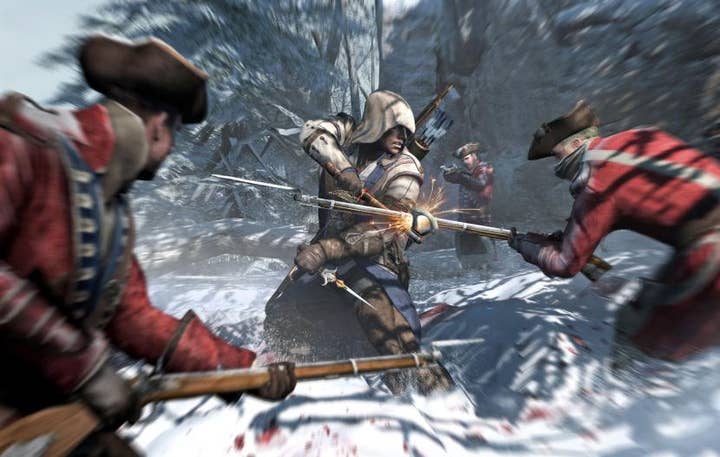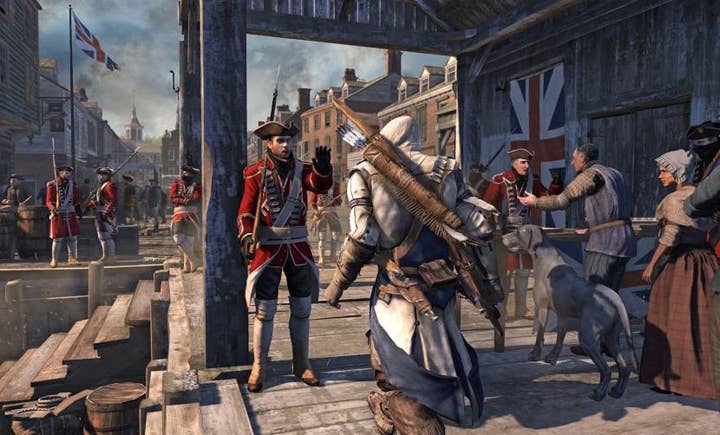Assassin's Creed 3: Revolutionary Direction, Global Appeal
British gamers need not hold their nose, as UC Santa Cruz Professor Gregory O'Malley explains a world of possibilities
Ubisoft recently drew back the curtain on Assassin's Creed III and revealed what the franchise would look like, post-Ezio. As had been rumored beforehand, the game will be set during the American Revolutionary War, with historical figures like George Washington, Benjamin Franklin and Charles Lee all making appearances. The game will focus on a new hero with an English father, and Mohawk mother named Ratohnhaké:ton (who will no doubt be more popularly known by his other name, Connor).
"We wanted a new personality, someone who would be fresh for players," said Alexander Hutchinson, Creative Director, Assassin's Creed III. "While Altair is driven by duty and Ezio by revenge, Connor is a man of the people: his goal is to resist injustice wherever he sees it. He begins by trying to fight for his people's place in America, but is eventually swept up into the revolution, and the struggle between Assassins and Templars."
This is a new direction for the franchise, bringing it into the "New World" and setting it during a period when European colonialism was at its peak. Change, however, ultimately brings skepticism from gamers; despite the popular assertion that hardcore gamers want things that are new, the amount of complaining online suggests otherwise. Look at the online protests demanding more information about a new Half-Life, the widespread criticism of Dragon Age II's altered focus and graphical style, and the initial wariness of BioShock Infinite being called a BioShock game at all (the last one I think most fans have gotten over).
"Being British was a core part of their identity and they had a hard time giving that up... So I think good fiction could play with that theme a lot"
Professor Gregory O'Malley
From what I've seen, the griping over Assassin's Creed III has not been as much about the main character as it is time and place. Late 18th century North America is a very different place than the Holy Land of the first Assassin's Creed and the large European cities depicted in Assassin's Creed II and its successors. The reduced number of urban environments has some players worried that rooftop scaling will be less compelling than in previous games, although it's heavily implied that there will be increased mobility through the trees, taking advantage of the rural setting.
Furthermore, there are many aspects that make the American Revolutionary War good source material for any sort of fiction. University of California Santa Cruz Assistant Professor of History Gregory O'Malley believes that the way the colonist loyalties were divided, the way some colonists alienated themselves from the British by living on the frontier, and the situation for those not even in the fight could all be sources for potentially engrossing storylines.

"There were a lot of people in North America who chose to remain loyal to Great Britain, so some American families ended up split, which could set the stage for some drama. For example, Ben Franklin's son sided with Britain and they almost never spoke again," said O'Malley, noting, "Both sides had Native American allies. Also many American colonists had spent a lot of time living on the frontier and had really changed. They seemed pretty foreign to the British, so that tension between the British and British-Americans who had kind of gone native seems interesting to me."
"If you deal with the home front at all, rather than just the front lines, there were also interesting dynamics with all the women who were left in charge of farms and plantations because the men had gone off to fight," he added.
Then, of course, there's the prickly issue of slavery. Both sides enlisted armed soldiers of African descent, so a slave or former-slave is certainly a possibility for a character in Assassin's Creed III.
"The British promised freedom to slaves who ran away from American plantations and helped the British war effort," said O'Malley. "Later the Continental Army also started accepting slave enlistments if their masters gave them permission to fight. James Armistead was a slave who became a spy for the rebelling colonists, pretending to run away to the British forces, but actually gathering information on the British to send back to the Americans. That kind of thing is fascinating to me, especially considering that we would assume a slave would resent his oppressors."
"The colonial American setting in Assassin's Creed III is definitely going to widen the appeal of the brand to a mainstream audience as the American Revolution was a key historical event worldwide"
Tony Key
Besides the setting, I sense a general worry among international players, particularly those from the UK, that Assassin's Creed III will be replete with jingoistic American rhetoric. Ubisoft has already indicated that not everyone British in the game will be evil; to date, every Assassin's Creed has made historical conflicts seem like proxy duels between the Templars and the Assassins, so I wouldn't expect anything less in this game. The fact that Connor's parents were killed by white colonists suggests that the game won't be black and white morally, and will hopefully demonstrate that the line back then between "Americans" and "British" was incredibly hazy.
"I think one thing that many Americans are unaware of is that people who stayed loyal to Britain were not necessarily cowardly, or unprincipled," detailed O'Malley. "We typically call the two sides 'patriots' and 'loyalists,' but the loyalists were patriots in their own minds; they were patriotic Britons. Being British was a core part of their identity and they had a hard time giving that up. They often had strong family and personal ties in Britain still and it was too painful to sever them. Many of them supported colonial demands for reform, but simply thought independence was not a wise or just course of action. So I think good fiction could play with that theme a lot."
And while the war is often depicted purely as one of American colonists facing down British soldiers, the reality was much more complex than that. While to the colonists it was a fight for independence, convincing France and Spain to join the war on their side made it a proxy European conflict. Then there were various Native American tribes that were involved in the periphery on both sides of the war, though it could be argued that they all ultimately lost regardless of their allegiance.
"I think most people from both sides don't realize how diverse and complicated the armies were," said O'Malley. "Slaves, Native Americans, French allies, German mercenaries, Scots Highlanders, free blacks from Saint-Domingue (Haiti) as part of the French forces. There was even a Polish general who was so inspired when he read the Declaration of Independence in a newspaper, that he got on the next ship to America and volunteered in the Continental Army. Most movies and fiction about the Revolution don't give much sense of that diversity, but early America was a crazy and diverse place with global connections."
There's an irony to me that despite some discomfort some people might have about moving the Assassin's Creed franchise to America, the US is the location for the best known British-made franchise on the planet: Grand Theft Auto. However, for the GTA series (and its Old West incarnation in Red Dead Redemption) American culture is a medium for satire. The parody is clever and observant enough that most Americans can either laugh at it or ignore it as they see fit; Assassin's Creed, by contrast, has always portrayed events in a very buttoned up manner.

I'd imagine one of the core issues for people in the UK is the idea of being the target of jingoistic declarations. There's probably an equal amount of discomfort to be portrayed as the antagonists in the conflict, a feeling that most Americans share about history. Some people in the US still defend the intentions of the Vietnam War to this day, and while that might shock some international readers, it shows how deeply feelings of patriotism can color a person's opinions.
I'm fairly certain that a game developed primarily in Canada for a multi-national French publishing house has no agenda of making the Americans appear angelic and the British beastly, however. The American Revolution was a seminal, landmark moment in history that positively affected self-determination around the world and is also a time period that frankly hasn't been given enough attention from video games.
Tony Key, Senior Vice President of Sales and Marketing at Ubisoft, fully believes that it's the right setting to expand the franchise even more.
"The colonial American setting in Assassin's Creed III is definitely going to widen the appeal of the brand to a mainstream audience as the American Revolution was a key historical event worldwide," said Key. "Assassin's Creed III adds color and detail to the colonial American setting in a way that's highly entertaining and has never been captured before in a video game. Assassin's Creed III is the perfect game for players who have not tried the brand before to jump into the franchise."
What I'm trying to say is, give the game a chance and don't just assume that it will be about some redneck 'Murica rather than Enlightenment Era America; I think Ubisoft Montreal has earned the benefit of the doubt. Besides, it might just be the perfect setup for an Assassin's Creed game set during the machinations of the French Revolution, and who honestly doesn't think that's an awesome idea?

